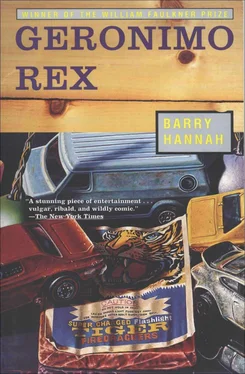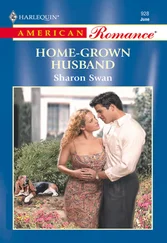The next time I saw Lariat outside of class was up at Leslie Harrow’s party in April. Leslie had lawyers, psychologists, librarians, theologians, hippies, art department camp-followers, and that crowd — all about to blow apart his place on Mount Sequoyah. When I got there, the booze had been working on them for an hour and a half. Some were dancing to the stereo — guitars and nigger-hollering. Wyatt Fred, the giant poet, was swerving about the area with six hours of whiskey in him. Hoyd passed us, smoking grass in a badly rolled paper that was falling apart in sparks all over him. Leslie was a thoughtful host. He took Prissy away from me and planted her over by the hearth between two girls who were all eyeglasses and cigarettes.
I went in the kitchen. Lariat was leaning by the refrigerator. Beside him was his Wild Turkey in a black crocheted cover. The kitchen looked over a counter to the room where many were dancing now. Lariat put his hand in the ice bag and came up with a handful that he dumped in a glass. He poured a nice potion from the black crocheted bottle into it. The drink was for me. I was astounded and honored.
“Who was that you came in with?” he asked.
“That was my wife.”
“Is she coon-ass?” This means Cajun in downhomé Louisiana idiom. I wouldn’t have thought Lariat would say that. I simply let it go by.
“She’s a nice little piece. I really wonder why you’re standing here with that drink with the music going on and that nice little piece out there. I’d think you wanted to dance with her.”
I looked out at the dancing mob.
“One thing I never did was dance,” he said.
I was feeling smug and above it. He poured me another drink. Then he left the kitchen and went out into the living room. I smiled at Hoyd and a few other people coming into the kitchen to make drinks. Thirty minutes later, Lariat came back. He had talked to her. We were the only ones in the kitchen.
“Is she stupid or is she sincere?” he asked. “Either way, she’s a nice little piece.”
“She’s sincere,” I said. I wasn’t sure on that point myself.
“What age is she?”
“Eighteen,” I lied.
“She is a darling. There was a blond boy telling her what a darling she was. He was saying he’d never seen anything like her. A student of mine. Divorced.”
I left the kitchen and lunged out into the crowd. Every-body was happy and forgiving. Some fell on the floor. A girl dancer was suddenly jerked out of my way. Prissy was not on the hearth where Leslie had set her, and the girls with eyeglasses were gone too. I looked behind me. Lariat had followed me over.
“Does she tend to run away?” he asked, right next to the stereo speaker.
“No.” I was very concerned.
“Does she ever have to go to the bathroom?”
“Yes!” I declared. Again I mashed through the dancers, seeking the bathroom door. I broke out of the crowd and ran to the first closed door of the hall. It was locked.
“That is one of the bathrooms,” observed Lariat. He had come back through the dancers too.
I kicked the door football-style. Then I turned the knob. It was locked but the door gave. I drove in. Some girl, not Prissy, jumped into the shower curtain of the tub and fell in, pulling up her hose.
“Who was that?” said Lariat.
“Not her.”
I led off toward the back bedrooms. Hoyd and two other men who looked like they were in a heedless fit, one of them a painter wearing overalls, seemed to be standing in a line outside a closed door.
“What are you doing?” I asked them.
“Waiting,” said the painter.
I elbowed through them and threw open the door. “Wait. You’ll have your turn,” came a voice from the shadows of the bed. A long-haired boy or man was squatting over the pile of coats on the bed with his pants down, alone.
“Pray to God she wasn’t in there,” said Lariat.
“No.” I wanted awfully to find Prissy. “Prissy! Prissy Darling!”
Back in the living room, the mob had grown fourfold. I pushed into the flank of the dancers. Then there was a shoulder on my hand. “Who is that?” said Lariat, who was pointing across a split in the dancers, having my hand on his shoulder. He had found her. Prissy was dancing halfheartedly with a blond man. She seemed to be the color of a new penny. I loved her, never before in this full and humble way loved her. I felt I would never be so lucky as to touch her. And would she remember me if I did? “Darling!” across the thighs and shins of the dancers. When she saw me she put out her hand, the blond man evaporated away through some slit of the house. I held her tiny moist hand with both of my hands. “Prissy, you can’t run away like this. I was looking all over for you, darling. I love you. Please be my wife.” I was damn near sobbing, and Prissy put her wet eyelashes against my throat.
I think Dr. Lariat had left the party. His crochet-covered bottle was still on the counter, but I never saw him again that night. Myself, I stayed in love for three months.
Lariat’s lectures changed a little. He talked more. He came out with anecdotes from his past. All of them were arid and pointless episodes and were introduced with no transition from the literary items at hand. Sometimes he tried out some stories he had heard from Cajun sages long ago, and tried to do the dialect, but his voice imitations were futile. They came from a man who had cherished none but his own voice, inviolate, for too many years. Hoyd laid his head on his desk and frowned at me.
“He’s down. He ain’t himself,” Hoyd said. “Something on his nerves. Did you hear what happened to him last week? In his side yard he’s got a goldfish pool with a boy, a cherub, sits up on the base in the middle of the pool. This cherub had a dick, an open dick; not much, but a dick, a minimalized Renaissance pecker. These people come by at night and knock the little thing off with a hammer. Lariat heard them in the water, but they ran off and got in a car and drove away.”
“I hadn’t heard.”
An afternoon in May I picked up this note in my box in the English office. Lariat wrote that if I was interested in playing snooker at 200 a point, I would be at his house Sunday night about seven. He’d bought a table. He wrote: “I’ll be disappointed if you don’t show up.”
He lived in the oak-covered section of Fayetteville at the flat meadow between the mountain and the highway. There were some rich homes here. His house was constructed of molasses-brown bricks. There was not much front yard; the pool and the willow trees sat in a rectangular basin to the south side of the house. On the other end of the house was the chipped-brick driveway and the garage. One of the pea-fowl picked around the house toward me as I waited at the door. “Watch it, watch it,” I said.
Inside, well, very nice — potted fronds and ferns, rugs from Turkey, a banana tree, a piano, lots of solitary chairs and small couches. The south end of the house was almost all glass, so you could look out on the pool and the willows.
“I heard you had some trouble. The statue,” I said.
“They waded right in and did it. I take it as a symbol of the South — I don’t know whom to suspect, the Baptist minister, high school punks, an angry ex-student, a drunk, or an Episcopal aunt.”
The table was in the basement. It had tan felt like the one in Roger’s, and was level. Lariat had fixed up a chromium reflector for the hanging light bulb. Also there was a blackboard, a child’s affair with the alphabet and corresponding animals, for scoring. Here was a man who took his gaming seriously.
“First of all,” I said, “I can’t afford twenty cents a point I’m used to playing for a nickel.”
The crisp, passing smile came on his face.
Читать дальше












